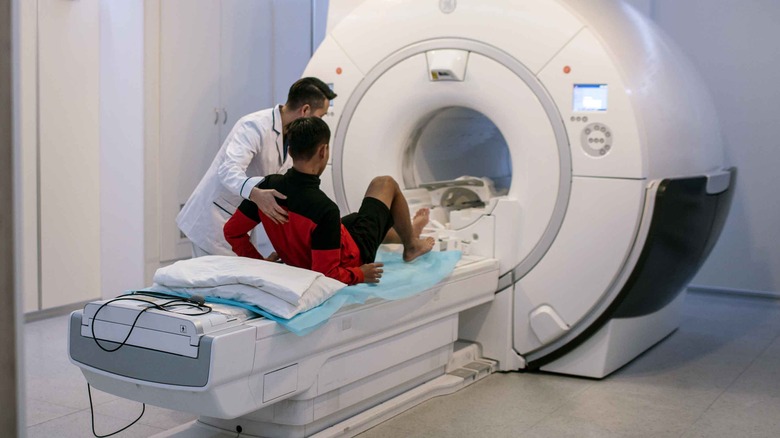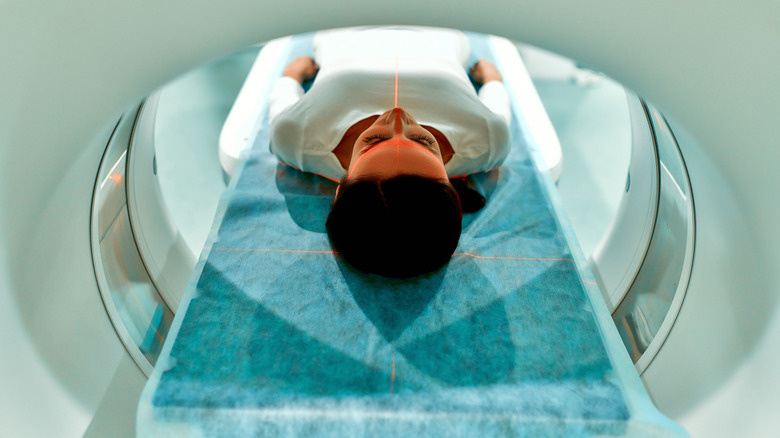Things You Should Never Do Before Getting An MRI
Magnetic resonance imaging (MRI) scans are one of the means by which medical professionals can see the insides of the body (via the National Institute of Biomedical Imaging and Bioengineering). To achieve this, the MRI machine uses strong magnets and radio frequencies to produce three-dimensional pictures of the body's internal structures. Your doctor might ask you to get an MRI scan to diagnose a medical condition or to observe the progress of your condition while it's being treated. An MRI scan can be used to assess different parts of your body such as your head, heart, breast, joints, digestive organs, and reproductive organs (via WebMD).
Getting an MRI might feel like a big procedure, but it's really common. About 30 million MRI scans are performed in the U.S. alone each year (via Envision Radiology). And the technology behind the MRI machines have been tweaked and improved since the first one was made in 1980, per Ezra. The MRI scan stands out from the X-ray and computed tomography (CT) scans because it doesn't use ionizing radiation. It also produces clearer images and is the scan of choice for spotting conditions in the soft tissues, joints, ligaments, and tendons (via Envision Radiology).
What to expect while getting an MRI scan
If your doctor deems it necessary for you to have an MRI, you will schedule an appointment. Before getting the scan, you will need to fill out a screening form, and your technologist might ask you some questions to make sure it's safe for you to get scanned. Metals are prohibited during an MRI scan. So, you will need to remove all metallic objects on your clothes or wear a hospital gown (via the International Society for Magnetic Resonance in Medicine). If your doctor needs really clear images, you'll be given a contrast agent through an intravenous (IV) injection. And if you are claustrophobic or anxious about the scan, you may be given medications to calm your nerves (via Medical News Today). Children who might get fussy and move around during the scan may need to be sedated beforehand, explains the National Health Service (NHS).
Your technologist will prepare you for the procedure, and once you're ready, they will position you and start the scan. The machine can get really noisy during your scan, so you'll be offered headphones. You can listen to a good playlist or even watch a movie to drown out the noise (via Family Doctor). Your technologist may not be in the same room with you, as they'll need to operate the machine from another room. You'll still be able to communicate with them, though, via a panic button that will indicate to them you need to stop the scan. If you need to, you can have someone with you in the scanning room, but they shouldn't have any metals within or on their body (via the NHS).
You don't have to do much to prepare for your scan
Getting an MRI is an important procedure, but the its beauty is that you don't really need to do anything special before the scan, except, maybe, going to the hospital (via Ezra). Generally if there's anything you should do, your doctor will let you know. So, you don't need to fast before your scan, or drink lots of water, unless you're asked to. You should be able to take your regular medications before the scan, but it's important to let your doctor know about any medications you take to get proper advice.
Since metals are nor allowed in the MRI scanning room, it's best to leave unnecessary jewelry at home, although they'll be kept for you if you remove them at the hospital. If you choose to wear your own clothes for the scan, make sure they don't have metals like buttons, zippers, or bra underwires. Just to be safe, you should also come without makeup, since metallic substances can be found on some mineral-based cosmetics such as blushes, eyeshadows, lipsticks, nail polishes (via Providence). Deodorants and antiperspirants, too, contain aluminum salts that can interfere with MRI images, so it's best to skip them before coming or wipe them off, says Hamlet Hub.
Don't be nervous about your safety
The MRI is considered a very safe scan. It is not painful, and the scan does not harm the body or bring unwanted side effects. Unlike the X-ray or computed tomography (CT) scan, the MRI does not use ionizing radiation to produce its images, so if more than one scan is required within a brief time frame, performing them is not dangerous (via GE Healthcare).
The major safety concern with the MRI machine is its strong magnetic force. This force can throw around metal objects that are attracted to magnets and pose risks for anyone in the room. People who have metals within the body, including metallic implants or medical devices, are also at risk. The machine can move, heat up, or spoil these items and cause injuries or burns (via Radiology Info). According to the U.S. Food and Drug Administration (FDA), the loud noise from the machine can damage the ears and lead to hearing loss and ringing in the ears (tinnitus) if the ears are not protected. Finally, the contrast agent might cause some side effects and allergic reactions in some people. However, these hazards only represent what could possibly happen. Out of the millions of MRI scans performed in the U.S. every year, such problems are rare.
Never hide the fact that you have something metallic in your body
It is important that you tell your providers about any metals in your body, states the NHS. These metals could be fragments from bullets or shrapnel, or implants and medical devices like artificial joints, nerve stimulators, pacemakers, cochlear implants, artificial heart valves, or insulin pumps. The metals can respond to the MRIs magnetic force even though they are in the body. This could lead to serious injury or burns if they move or heat up during the scan. Metallic implants and medical devices can also get dislodged or damaged. This might be risky if the equipment are vital to life (via Radiology Info).
You may still be able to get an MRI even if you have metal in your body, says the NHS. Your doctor will decide what to do depending on the kind of metal. The scan might be done with extra caution, or your doctor may opt for another type of scan like an X-ray or CT scan. However, diagnostic radiologist Dr. Scott Flamm explains at the Cleveland Clinic that larger metallic objects can distort the image produced by a CT scan, which is a consideration.
Never hide tattoos or permanent makeup
If you are one of the more than 145 million Americans with a tattoo, it might be worth letting your doctor know that you've got one before your MRI scan. If your tattoo ink contains metals, you could experience irritation, a pulling sensation, or even burns when getting an MRI, per University of Virginia Radiology & Medical Imaging. The tattoo can also appear as a dark spot that makes it difficult to interpret your scan. In a similar manner, permanent or semi-permanent makeup can alter the image from your scan and confuse your doctor, says PMU Hub. If the pigment used for your procedure contains iron-oxide, there could be burning or swelling at the makeup site.
While getting a reaction on your tattoo site is possible, it is also rare. One study published in the New England journal of medicine had only one reaction out of 330 participants with tattoos. Another study published in Frontiers in Neurology included anyone with a tattoo or permanent makeup irrespective of size and location and reported no negative reactions.
To ensure your safety while getting scanned, Health Images advises that you let your technologist know about your tattoo so that they will monitor you. You can check with your tattoo artist to see if the ink used on you contains metals. You should also ask your artist about the pigments used for permanent makeup and disclose any such work you've had done before getting an MRI (even if you aren't asked), says PMU Hub.
Steer clear of flying metal debris before your scan, and let your providers know if you've been exposed before
Most of us probably won't be exposed to flying metal debris while going about our day. But if you're a sheet metal worker, you get exposed to tiny pieces of metals a lot while working, says Dr. Alex George, a musculoskeletal radiologist who spoke to RAYUS Radiology. And this metal debris can get stuck in your eye without you noticing it. During an MRI scan, these metals can heat up or move and injure an important eye structure, says Dr. George. If there's a chance that you have metal pieces stuck in your eyes, your doctor will request a CT scan first to confirm whether or not there's anything there. Though MRI technologist Travis Gould noted to RAYUS Radiology that it's uncommon to find these metals, a safety check is worthwhile to avoid possible damage to your eyes.
Medical professionals are extra vigilant about this screening. This is because a former sheet metal worker was blinded in 1985 after an MRI because a tiny piece of metal stuck in his eye moved during the scan (via MRI Questions). This case upset the medical community, and professionals came up with stricter screening guidelines. Since then, only four other cases of incidents involving metal in a patient's eye during an MRI scan have been reported. Thankfully, none had serious damage to their eyes.
Don't forget to tell your doctor about a kidney problem
The Mayo Clinic advises that you let your doctor know about any kidney problems you have. MRI scans without contrast agents are generally safe if you have a kidney problem. But MRI scans done with some older gadolinium-based contrast agents could lead to a condition known as nephrogenic systemic fibrosis if you have a kidney problem. This condition, according to the National Kidney Foundation, majorly affects the skin by causing burning, itching, and redness. It could also lead to joint problems and muscle weakness. These symptoms can show up anytime between a day to three months after your MRI.
The kidneys are responsible for getting rid of the contrast agent. These agents might take longer to leave your body if your kidneys are not functioning properly, explains the UCSF Department of Radiology and Biomedical Imaging. It's when your kidneys can't get rid of the contrast agent that you get nephrogenic systemic fibrosis. To avoid this, you will need to take a test to evaluate your kidney function and find out if your kidneys are performing well enough to be able to remove the contrast agent. Usually, people over age 60 and those with conditions such as diabetes that can affect renal function are also tested.
Don't keep pregnancy or breastfeeding a secret
Apart from ultrasound scans, MRI scans are commonly used during pregnancy to diagnose a number of conditions that affect the mother or baby. This is because they don't use ionizing radiation, which poses risks to the baby. When compared to the ultrasound, MRI scans provide clear images and are less subject to operator error, according to a review published in the Journal of personalized medicine.
It's a good idea to let your providers know that you are pregnant or breastfeeding before getting an MRI scan, says Mother to Baby. The American College of Obstetricians and Gynaecologists in their guidelines notes that an MRI may be performed during any trimester of pregnancy, but recommends that MRI scans with contrast only be used for pregnant women when absolutely necessary. And if they must be used, only gadolinium-based contrast agents are recommended. This is because not much is known about how long contrast agents remain in the amniotic fluid and the fetus's blood. If these agents stay too long, they could become toxic to the fetus. The guideline does not recommend that women stop breastfeeding if a contrast agent is used, though, as the quantity of contrast passed to the baby through breast milk is too small to cause harm.
If you feel anxious or claustrophobic, don't keep that to yourself
Many people feel anxious before getting their MRI scan. This might be because of not really knowing what to expect during the scan, the loud noises made by the machine, or what the scan results could mean, says The Recovery Village. Also, for about 7-10% of the population who are claustrophobic, getting an MRI scan can be challenging, and the close confines of the machine may prevent them from even getting scanned. For these people, being in the enclosed MRI environment can trigger nausea, dizziness, sweating, a racing heart, or dry mouth.
The site advises that you discuss your anxiety or claustrophobia with your providers so that you can be made more comfortable during the procedure. Your doctor might prescribe anti-anxiety drugs or an intravenous injection to sedate you, says Iowa Radiology. Blankets to make you comfortable as well as calming music can be provided while you're in the machine. You can also try counting your breaths, using guided meditation, or taking note of every part of your body, a technique known as grounding, to remain calm.
Newer open MRI machine models exist that solve the problems of people who are claustrophobic or experience panic attacks, says Health Images. They are not enclosed and are quieter than older closed models. However, not all types of scans can be done using open MRI machines, and closed MRI machines are usually more accurate.
Don't forget to disclose a previous allergic reaction
Although rare, allergic reactions to gadolinium-based contrast agents can happen. According to a review published in Frontiers in Allergy, allergic reactions occur only 0.04-0.7% of the time, and they can be managed when they happen. Allergic reactions mostly involve itching, rashes, hives, and swelling of the skin. Wheezing, rhinitis, conjunctivitis, gut symptoms, anaphylaxis, and anaphylactic shock are other possible symptoms. These reactions often happen immediately when the contrast is given, but they might be delayed to later in the day or the next day. It's also possible to have side effects to the contrast like pain at the injection site, nausea, vomiting, dizziness, headache, skin prickling, muscle pain, or joint stiffness, though these reactions are also uncommon.
If you've had a previous allergic reaction to a contrast agent, you're more likely have another reaction, notes Stanford Medicine. You are also at risk if you are allergic to medications, iodine, or shellfish, or have asthma, sickle cell disease, low blood pressure, or anemia. Your doctor can prescribe steroid medications to prevent another reaction if you had one before, says Memorial Sloan Kettering Cancer Center. If you experience an allergic reaction, you should eat normally and drink lots of water unless you're told otherwise. Bland, low-fat foods like white rice and toast are your friends if you feel queasy. You should seek emergency help if your symptoms get worse (via University of Michigan Health).
Don't forget to plan for your scan
Getting an MRI scan isn't quick. It's a good idea to schedule sufficient time for it. You'll likely spend some time at the hospital before your scan to be evaluated and prepared for the scan (via the Hospital for Special Surgery). The scan itself can take as long as 90 minutes or just 15 minutes. It will depend on the size of the body part being scanned and how many times that area needs to be scanned. Also, MRI scans with contrast agents take about 15-30 minutes longer than scans without contrast (via Healthline). An MRI scan with sedation will take about 30 minutes longer, and you might need to spend up to two hours at the hospital to recover from sedation, says the Hospital for Special Surgery.
Most times, you'll be able to jump right back to your regular activities after your scan while you wait for about two weeks to get your results (via Patient). But if you've been sedated, you should avoid driving, operating heavy machinery, or consuming alcohol within a day of your scan, states the NHS. Per the University of Michigan Health you also shouldn't drink alcohol for a day if you have an allergic reaction to the contrast agent. Additionally, they advise that you don't drive if you were given Benadryl or an EpiPen due to an allergic reaction. Since you're not allowed to drive in these cases, you will need to have someone to take you home after your scan.












